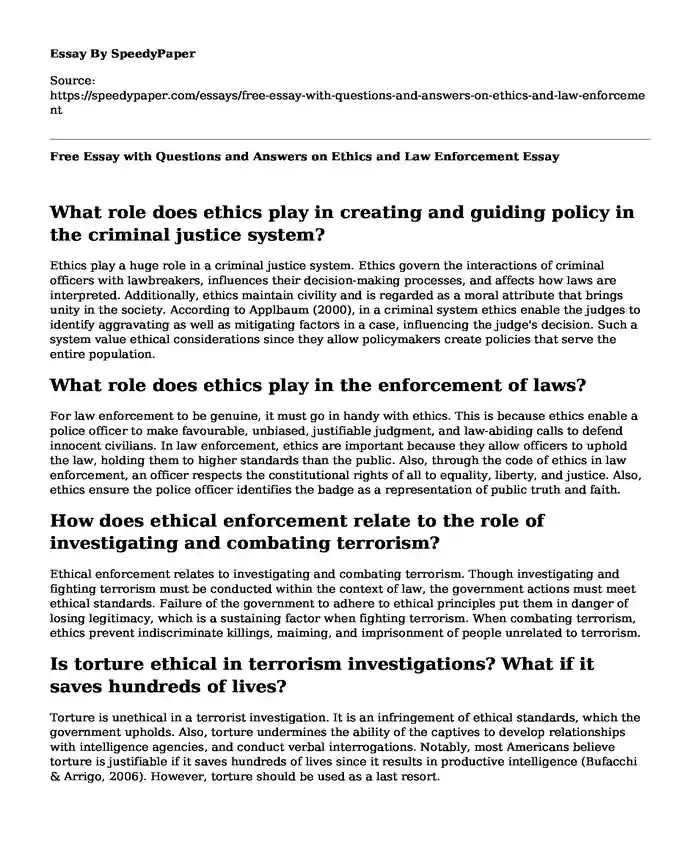
| Type of paper: | Essay |
| Categories: | Terrorism Ethics Criminal justice |
| Pages: | 3 |
| Wordcount: | 699 words |
What role does ethics play in creating and guiding policy in the criminal justice system?
Ethics play a huge role in a criminal justice system. Ethics govern the interactions of criminal officers with lawbreakers, influences their decision-making processes, and affects how laws are interpreted. Additionally, ethics maintain civility and is regarded as a moral attribute that brings unity in the society. According to Applbaum (2000), in a criminal system ethics enable the judges to identify aggravating as well as mitigating factors in a case, influencing the judge's decision. Such a system value ethical considerations since they allow policymakers create policies that serve the entire population.
What role does ethics play in the enforcement of laws?
For law enforcement to be genuine, it must go in handy with ethics. This is because ethics enable a police officer to make favourable, unbiased, justifiable judgment, and law-abiding calls to defend innocent civilians. In law enforcement, ethics are important because they allow officers to uphold the law, holding them to higher standards than the public. Also, through the code of ethics in law enforcement, an officer respects the constitutional rights of all to equality, liberty, and justice. Also, ethics ensure the police officer identifies the badge as a representation of public truth and faith.
How does ethical enforcement relate to the role of investigating and combating terrorism?
Ethical enforcement relates to investigating and combating terrorism. Though investigating and fighting terrorism must be conducted within the context of law, the government actions must meet ethical standards. Failure of the government to adhere to ethical principles put them in danger of losing legitimacy, which is a sustaining factor when fighting terrorism. When combating terrorism, ethics prevent indiscriminate killings, maiming, and imprisonment of people unrelated to terrorism.
Is torture ethical in terrorism investigations? What if it saves hundreds of lives?
Torture is unethical in a terrorist investigation. It is an infringement of ethical standards, which the government upholds. Also, torture undermines the ability of the captives to develop relationships with intelligence agencies, and conduct verbal interrogations. Notably, most Americans believe torture is justifiable if it saves hundreds of lives since it results in productive intelligence (Bufacchi & Arrigo, 2006). However, torture should be used as a last resort.
How will ethics play into the future of law enforcement and related decision-making?
Ethics will play an imperative role in future law enforcement with the advancing technology. Ethics will allow the continual use of critical thinking tests, media tests, and will ensure that new cadets receive ethical training before starting their profession. Also, ethics will allow continued use of core values and will guide law enforcement officers in instilling moral behaviours in their fellow officers, to create ethical leaders. Ethics will allow the training of cadets in their academies to emphasise the importance of displaying ethically upright behaviour.
Should there be mandatory ethics courses? Why or why not? If so, how often should they be attended?
There should be mandatory ethics classes to train officers in there in the profession. Today's society has forgotten about ethics, especially in the face of social media, since ethics is the base of morality. Also, ethics allow people be less dogmatic, more tolerant, and clear about their commitments. Also, mandatory ethics classes heighten people's awareness of the tenets of the core of ethics. The length of pre-service academy training usually is 20-26 weeks whereas two-four hours assigned to ethics. I think the officers should devote more hours or rather have regular ethic classes.
Is there any police department currently requiring mandatory ethics training on an annual basis? If so, what departments?
There are police departments that are currently requiring mandatory ethics training on an annual basis. An example of such department is Texas Department of Criminal Justice, which requires ethics training every year. The training incorporates different subjects every year, and some change depending on every year's current events. In addition, the training requires officers to qualify with their weapons once a year.
References
Applbaum, A. I. (2000). Ethics for adversaries: The morality of roles in public and professional life. Princeton University Press.
Bufacchi, V., & Arrigo, J. (2006). Torture, Terrorism and the State: a Refutation of the TickingBomb Argument. Journal of Applied Philosophy, 23(3), 355-373.
Cite this page
Free Essay with Questions and Answers on Ethics and Law Enforcement. (2022, Jun 06). Retrieved from https://speedypaper.net/essays/free-essay-with-questions-and-answers-on-ethics-and-law-enforcement
Request Removal
If you are the original author of this essay and no longer wish to have it published on the SpeedyPaper website, please click below to request its removal:
- Free Essay: Getting out of Debt is Like Holding a Tea Party in Difficult Situation
- Essay Sample on the Film, Finding Nemo
- Free Paper: Aligning the Enrolment of Students with Placement Opportunities by Universities in Rural Pennsylvania
- Free Essay: Benefits and Challenges of Having One Channel Partner in the Example of Martin Guitar
- A Biography Essay Example: Vincent Van Gogh and Robert Frost
- Lies My Teacher Told Me by James Loewen, Article Review Essay
- Essay Example on Effective Billing and Management of Revenues
Popular categories




